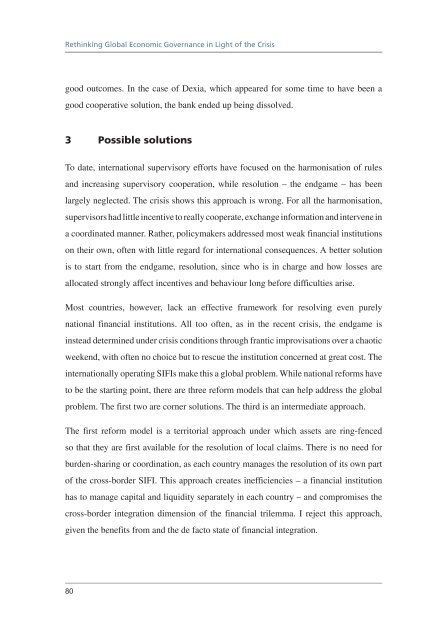Download PDF - Vox
Download PDF - Vox
Download PDF - Vox
- No tags were found...
Create successful ePaper yourself
Turn your PDF publications into a flip-book with our unique Google optimized e-Paper software.
Rethinking Global Economic Governance in Light of the Crisisgood outcomes. In the case of Dexia, which appeared for some time to have been agood cooperative solution, the bank ended up being dissolved.3 Possible solutionsTo date, international supervisory efforts have focused on the harmonisation of rulesand increasing supervisory cooperation, while resolution – the endgame – has beenlargely neglected. The crisis shows this approach is wrong. For all the harmonisation,supervisors had little incentive to really cooperate, exchange information and intervene ina coordinated manner. Rather, policymakers addressed most weak financial institutionson their own, often with little regard for international consequences. A better solutionis to start from the endgame, resolution, since who is in charge and how losses areallocated strongly affect incentives and behaviour long before difficulties arise.Most countries, however, lack an effective framework for resolving even purelynational financial institutions. All too often, as in the recent crisis, the endgame isinstead determined under crisis conditions through frantic improvisations over a chaoticweekend, with often no choice but to rescue the institution concerned at great cost. Theinternationally operating SIFIs make this a global problem. While national reforms haveto be the starting point, there are three reform models that can help address the globalproblem. The first two are corner solutions. The third is an intermediate approach.The first reform model is a territorial approach under which assets are ring-fencedso that they are first available for the resolution of local claims. There is no need forburden-sharing or coordination, as each country manages the resolution of its own partof the cross-border SIFI. This approach creates inefficiencies – a financial institutionhas to manage capital and liquidity separately in each country – and compromises thecross-border integration dimension of the financial trilemma. I reject this approach,given the benefits from and the de facto state of financial integration.80














